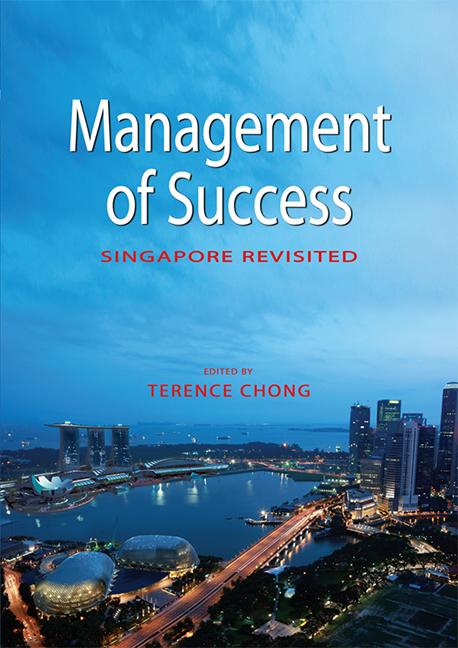Book contents
- Frontmatter
- Contents
- List of Tables and Figures
- Foreword
- Message
- Quote
- Preface
- The Contributors
- 1 Introduction: The Role of Success in Singapore's National Identity
- SECTION 1 SINGAPORE IN THE BIGGER PICTURE
- SECTION 2 LEADERSHIP, POLICY AND POLITICS
- 4 PM Lee Hsien Loong and the “Third Generation” Leadership: Managing Key Nation-building Challenges
- 5 Political Consolidation in Singapore: Connecting the Party, the Government and the Expanding State
- 6 The Evolving Social Compact and the Transformation of Singapore: Going Beyond Quid Pro Quo in Governance
- 7 The Ardour of Tokens: Opposition Parties’ Struggle to Make a Difference
- SECTION 3 THE RESTRUCTURING OF THE ECONOMY
- SECTION 4 THE TRANSFORMATION OF SOCIETY
- SECTION 5 THE LAW
- SECTION 6 MODIFICATION OF THE ENVIRONMENT
- SECTION 7 COMMUNITY AND NATIONAL SECURITY
- SECTION 8 LIFE IN SINGAPORE
- Index
6 - The Evolving Social Compact and the Transformation of Singapore: Going Beyond Quid Pro Quo in Governance
from SECTION 2 - LEADERSHIP, POLICY AND POLITICS
Published online by Cambridge University Press: 21 October 2015
- Frontmatter
- Contents
- List of Tables and Figures
- Foreword
- Message
- Quote
- Preface
- The Contributors
- 1 Introduction: The Role of Success in Singapore's National Identity
- SECTION 1 SINGAPORE IN THE BIGGER PICTURE
- SECTION 2 LEADERSHIP, POLICY AND POLITICS
- 4 PM Lee Hsien Loong and the “Third Generation” Leadership: Managing Key Nation-building Challenges
- 5 Political Consolidation in Singapore: Connecting the Party, the Government and the Expanding State
- 6 The Evolving Social Compact and the Transformation of Singapore: Going Beyond Quid Pro Quo in Governance
- 7 The Ardour of Tokens: Opposition Parties’ Struggle to Make a Difference
- SECTION 3 THE RESTRUCTURING OF THE ECONOMY
- SECTION 4 THE TRANSFORMATION OF SOCIETY
- SECTION 5 THE LAW
- SECTION 6 MODIFICATION OF THE ENVIRONMENT
- SECTION 7 COMMUNITY AND NATIONAL SECURITY
- SECTION 8 LIFE IN SINGAPORE
- Index
Summary
THE SINGAPORE SOCIAL COMPACT
All societies are governed by social compacts, whether implicit or explicit. In articulating the relationship between the state and the people, a social compact is in essence the substance of state society relations in which the government is often the proxy for the state. So embedded is the idea of social compacts in governance and contemporary political discourse that the fulfillment of the social compact has become a cornerstone of political accountability and a rich source of political authority and moral legitimacy for governments. Singapore's social compact has been of critical importance in its transformation from an “improbable nation” to a “first world oasis” despite lacking the “ingredients of a nation”. This nurturing of state-society cohesion, of course, requires deliberate policy intervention in various facets of life. Of late, the social compact has gained increased importance and relevance. In making policy initiatives and changes, the People's Action Party (PAP) government has recently made constant reference to and increasingly emphasized the ideational substance over the tangible benefits of the social compact. While differential understanding and expectations abound as to its scope and purpose, identified pressures and risks to the social compact include the growing income gap, the lack of a caring society, ethnic divisiveness, religious extremism, demographic and immigration policies, and even ministerial pay.
The social compact is intimately connected with the PAP government's legitimacy, which Khong describes as a “two-way process — claiming the right to rule, on the one side, and acknowledging it, on the other”. Legitimacy, premised on the government's delivering sustained economic growth with equity, begets trust in the government. The 1989 volume of Management of Success comprehensively chronicles Singapore's economic performance and the effective management of critical socio-political problems between Singapore's fledgling nationhood and the 1980s. By the late 1990s, one could detect in Singapore: Re-engineering Success the sea-change in the challenges Singapore faced. By then, systemic maintenance and the management of success were taken for granted as the hallmarks of the Singapore brand of governance. They were, and are, regarded as the sine qua non for the continuing trust and legitimacy in the PAP leadership.
- Type
- Chapter
- Information
- Management of SuccessSingapore Revisited, pp. 80 - 99Publisher: ISEAS–Yusof Ishak InstitutePrint publication year: 2010

